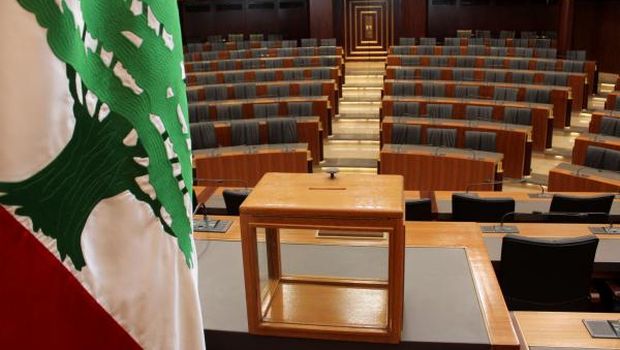
A ballot box sits on a table next to the national flag at the Lebanese Parliament in the capital Beirut on April 22, 2014 ahead of the country’s presidential election. (AFP Photo/STR)
Beirut, Asharq Al-Awsat—Lebanese politicians have failed to guarantee a quorum for Wednesday’s parliamentary session, which is set to make another attempt to elect a successor for President Michel Suleiman.
Under Lebanon’s complex, confessional-based political system, in which top political posts are reserved for members of specific sects, the presidency is traditionally the preserve of Maronite Christians. So far, no figure from among the country’s Maronite Christian community has emerged with enough support among Lebanon’s fractious political parties to win a majority vote in parliament, meaning that many MPs may stay away from the second round of the sessions to select a new head of state.
The two largest political blocs continued to disagree on candidates for the post over the weekend. Leading members of Hezbollah, a member of the March 8 Alliance, said that they remain opposed to Samir Geagea of the Lebanese Forces party, a member of the rival March 14 Alliance.
In turn, MPs from the Future Movement, the largest party in Lebanon’s 128-seat parliament and a major component of the March 14 alliance, reiterated their support for Geagea and their opposition to Michel Aoun of the Free Patriotic Movement, the largest party in March 14.
Aoun has yet to officially enter the race, though his supporters say he will consider running if something approaching a consensus on his candidacy.
Hezbollah MP Ali Fayyad said on Saturday the next president “must be a friend of the resistance and must reflect the aspirations of Lebanese people. He must also adhere to the current ministerial statement and express its political content; as for those who object to the ministerial statement, there is no place for them in the presidency.”
Geagea, the only former warlord jailed for his part in the Lebanese Civil War, is known for his strong anti-Hezbollah views. Lebanon’s current cabinet endorsed the role of Hezbollah in Lebanon’s political scene and its continued maintenance of an armed militia force in its ministerial statement, traditionally a declaration of principles which must be approved by a parliamentary vote when it takes office.
Speaking at a memorial service in southern Lebanon, Fayyad added: “It is no secret that the balances in the parliament and its composition do not allow one faction [to rule] alone without the cooperation of other factions, to help someone to the presidency, because the quorum of the election session should be two thirds of the members of parliament in every election cycle, and therefore, we are all obliged to deal with the issue realistically and responsibly, in a manner which serves the interests of the nation.”
Hezbollah’s member and minister of state for parliamentary affairs, Muhammad Fneish, criticized Geagea’s nomination. He said: “The candidate who does not achieve consensus among the Lebanese [people], but instead causes division before even reaching the election stage, is surely not suitable for the post.”
He added: “The candidate who has nothing on his record that encourages his selection, and instead has on his record tragedies and blemishes which make many Lebanese people remember his past and the harm it caused Lebanon and the Lebanese people . . . he cannot be qualified for the post,” in reference to Geagea’s role in the civil war.
The first round of votes for a new president took place last Wednesday and saw Geagea win 48 out of the 124 votes of the MPs who attended the session. Meanwhile, 52 MPs handed in a blank paper—all from the March 8 Alliance MPs—and 16 MPs voted for Henry Helou, who was nominated by Druze leader Walid Jumblatt, of the Progressive Socialist Party.
Leader of the Lebanese Kataeb (Phalangist) Party—a member of March 14—and former Lebanese President Amine Gemayel won one vote, despite announcing he was not running in the first round. Seven votes were declared null and void.
Legislators from Aoun’s party reiterated on Sunday that he had no intention to put himself forward until asked to do so. MP Salim Salhab said: “Aoun will not nominate himself for the presidency of the republic except if people agreed on him, because he does not want to be a challenging candidate.”
Meanwhile, Future Movement MPs denied the possibility of rifts within the March 14 Alliance, maintaining that they were backing a single candidate, Geagea, despite rumors that Gemayel planned to enter the race in the second round.
Future Movement MP Ghazi Youssef also denied that there was any agreement between Saad Al-Hariri and leader of the Change and Reform parliamentary bloc Michel Aoun, regarding the presidency.
In a radio interview on Sunday, he said: “We are, and will remain, united behind one candidate who represents the March 14 Alliance, and we will try to get him to the presidency, and if we fail to help a candidate from our political team, and there was a vacuum or disruption, I think the political forces must agree on a consensus candidate, and it is certain that he cannot be Aoun.”
